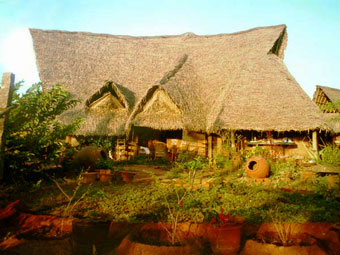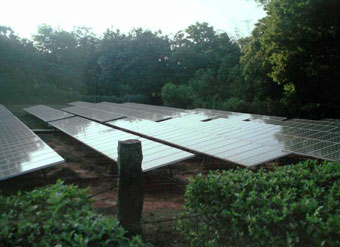Eco-village, Indian Style
Air Date: Week of July 18, 2003
Thirty years ago, a spiritual community was created in southern India. Auroville, as the community is known, devotes itself to peace and has become a model city for sustainable living. Andrew Blackwell reports.
Transcript
KNOY: In India, the state of Tamil Nadu sits at the southern end of the country where the Bay of Bengal, the Indian Ocean, and the Arabian Sea meet. It’s home to more than 60 million people and a thriving language and culture all its own. In the past two centuries, Tamil Nadu underwent intensive logging and overgrazing. Some lowlands along the Bay of Bengal were reduced from dense forest to virtual desert. With no forest to hold the soil, monsoon rains eroded deep gullies through the landscape, and by the mid-twentieth century, parts of Tamil Nadu were in danger of becoming uninhabitable. But despite these ecological challenges, a 30 year old spiritual community known as Auroville has thrived and become a model for sustainable living. Andrew Blackwell reports.
[SOUNDS OF WALKING IN FOREST]
BLACKWELL: Rita de Souza Zachaux walks through the front yard of her thatch-roofed house. It’s not so much a yard as a thick grove of trees, carpeted with tall, dry grass. This forest is especially important to her. After all, she planted it herself.
ZACHAUX: Let me show you my pride of trees. These are older, maybe 10 years old, and these are about four years old. And all the tall, shade-giving trees are from the earlier, pioneering years.
[FOREST SOUNDS]
BLACKWELL: The “pioneering years” that Rita refers to date back to the late 1960s. It was then that Auroville was founded by a French-born spiritual leader known as “The Mother,” and dedicated to the ideals of the late Indian philosopher Sri Aurobindo. The Mother laid out guidelines for a model city that would foster what she called “human unity.” Auroville, she said, would be a place where people could live as citizens of the world, devoting themselves both spiritually and materially to the goals of peace and international understanding. But when the first Aurovillians arrived on their site a few miles north of the city of Pondicherry, they found a bleak expanse of baked, lifeless clay. As a matter of survival, says Rita, forestry became a way of life.
ZACHAUX: It was some neem trees and palmyra trees, and it was not possible to take any walk in the sun until five o’clock on the land. Just scorching sun. So, we dug pits and we planted seedlings, saplings, and we watered them and we watched them, and it went on every year more and more, and then, okay, trees started growing…
BLACKWELL: After 30 years of hard work, the result is almost miraculous. Over two million saplings have been planted, and the landscape is lush with trees and other vegetation. Not only do the trees provide shade, but they keep moisture in the soil and prevent erosion. Interrupted only by a network of dusty dirt roads and outcroppings of houses and community buildings, forest now blankets Auroville’s nearly 5,000 acres. Indigenous wildlife that had long since left the area has returned. And the Aurovillians have also been able to do something they would never have been able to do otherwise. They’ve been farming.
[SOUND OF CUTTING PLANTS]
 The main building at the Windarra farm in Auroville. (Photo: Anamaria Aristizabal) The main building at the Windarra farm in Auroville. (Photo: Anamaria Aristizabal) |
BLACKWELL: At Windarra Farm in northern Auroville, workers are harvesting rosella, a hardy local plant with a bright pink bud which they clip and collect in baskets. Friederike Duenn, originally from Germany, runs the farm. She walks among the stiff, shoulder-high bushes, inspecting the crop.
DUENN: It really spreads, so one time only I had to sow them, and now they are just wildly spreading every year. It’s very nutritious, rich of vitamin C. It’s a very good crop. Also, when they’re harvested, they can just decompose and it’s a good organic matter again for the soil. [FARMING SOUNDS] BLACKWELL: Farming here is scrupulously organic and Aurovillians grow indigenous crops that are appropriate for local conditions. This reduces the need for irrigation and avoids degrading this land, which has been so painstakingly restored. It’s consistent with the idea of living sustainably on the land, a spiritual concept in Auroville. Again, Friederike. DUENN: I came to Auroville because I was interested in the spiritual idea: to really be as simple as possible. To eat as simple and healthy as possible, for example. And that means, that we should also grow what we essentially need BLACKWELL: People may come to Auroville to pursue spirituality and simplicity, but Auroville itself has grown increasingly complex. What began with a small group of people growing trees, and then planting food, is now a township of over 1700 people, The economy has become equally dependent on entrepreneurial spirit and international fundraising. Some Aurovillians subsidize their lifestyles with money saved before they came to India, or with businesses that sell incense, textiles, and other crafts through stores around the country. And life at Auroville is starting to take on distinctly urban overtones. [CAFETERIA SOUNDS] BLACKWELL: It’s lunchtime at the Solar Kitchen, one of a growing number of large institutional buildings in Auroville. Hundreds of people file in to the cafeteria, a wide brick building with an airy interior. The food here is simple but tasty, with lots of lentil stew and rice, or western imports such as spaghetti with fresh tomato sauce. Whatever the dish, it’s all cooked with solar power. GIGAND: When we decided to build this canteen in which we want to food for 1,000 people, we decided to go for steam cooking. So we thought that we could use the sun to produce the steam. [MACHINERY SOUNDS] BLACKWELL: Gilles Gigand, a civil engineer from France, first came to Auroville 29 years ago. Right now, he’s standing on the roof of the Solar Kitchen next to his pride and joy: a gigantic mirrored bowl, almost fifty feet across, built into the roof of the building. In the heat of the south Indian sun, the glare is almost blinding. GIGAND: So basically, the heat of the sun gets transferred into heat transfer fluid, which is circulating in this coil, in this receiver, and then there is a heat exchanger where it is transformed into steam, and so the heat is passed on to the food. BLACKWELL: The Solar Kitchen is just one instance of environmentally friendly technology in use at Auroville. Other examples pop up everywhere. Farmhouses use solar electricity. Windmills peep above the trees. Apartments and community buildings are built with local materials that are inexpensive and energy efficient. With all these experiments in sustainability and renewable energy, Auroville has become something more than an overgrown commune. It’s become a laboratory of sorts, and an inspiration to other Indian cities. BABU: Water harvesting, organic farming, usage of local materials, building technologies, solar energy, these could easily be replicated without much difficulty BLACKWELL: N. Raghu Babu is a project leader at the Indian government’s Central Pollution Control Board. He has taken municipal officials on field trips to Auroville to stimulate their imagination in dealing with environmental challenges. BABU: This is not a replicable model in toto. But this is a place where you could learn and you could probably gain confidence. And this is a place probably people could go there to for look at the things and formulate their visions and their strategies. To this effect, Auroville is doing a wonderful work. [FOREST SOUNDS, BIRDS]
|

 Solar panels provide energy for most of the buildings in Auroville. (Photo: Anamaria Aristizabal)
BLACKWELL: For Rita, the wonderful work has less to do with eco-friendly technology or governmental vision, than with the satisfaction of taking an active part in preserving one’s ecosystem.
Solar panels provide energy for most of the buildings in Auroville. (Photo: Anamaria Aristizabal)
BLACKWELL: For Rita, the wonderful work has less to do with eco-friendly technology or governmental vision, than with the satisfaction of taking an active part in preserving one’s ecosystem.




